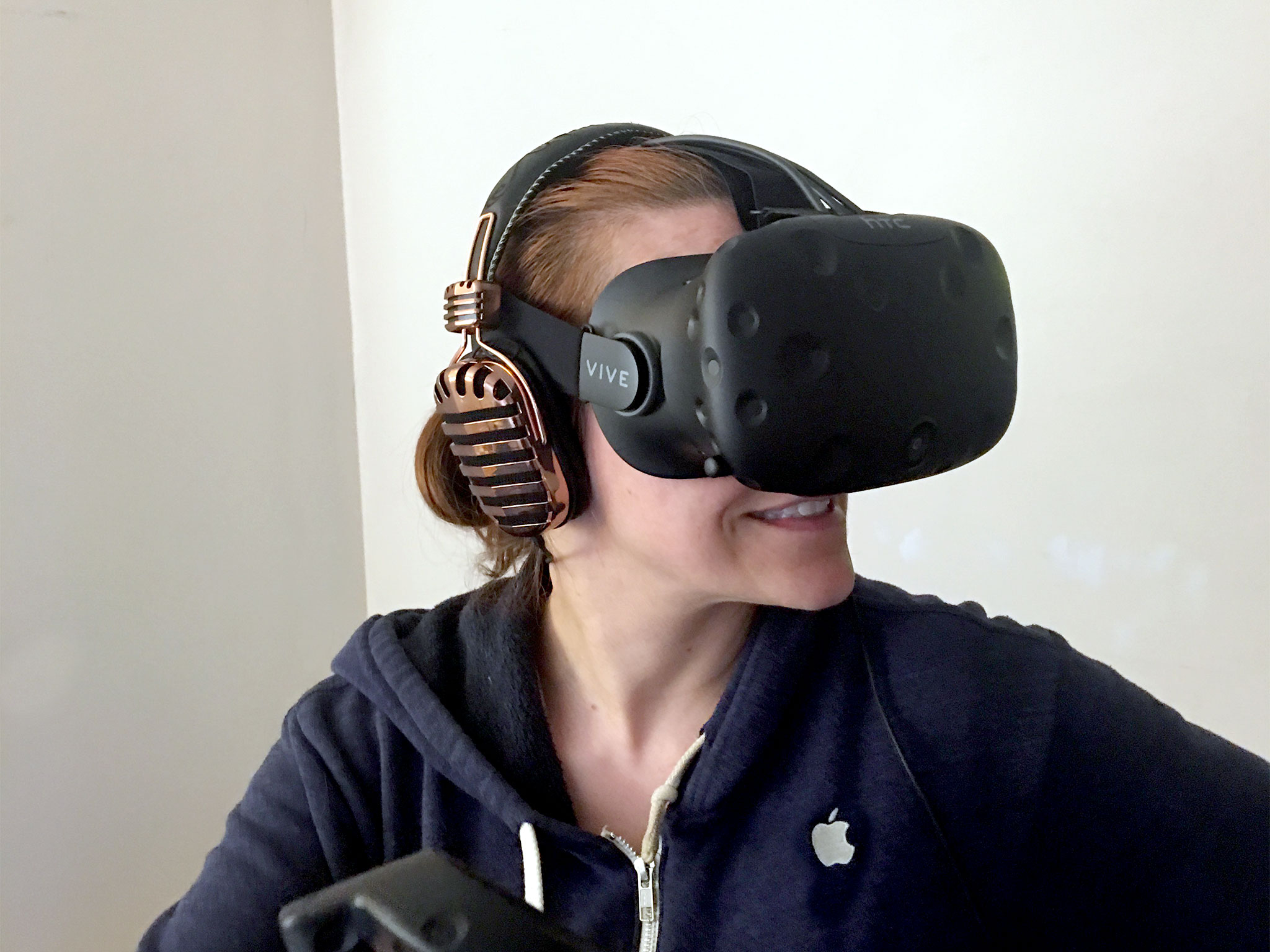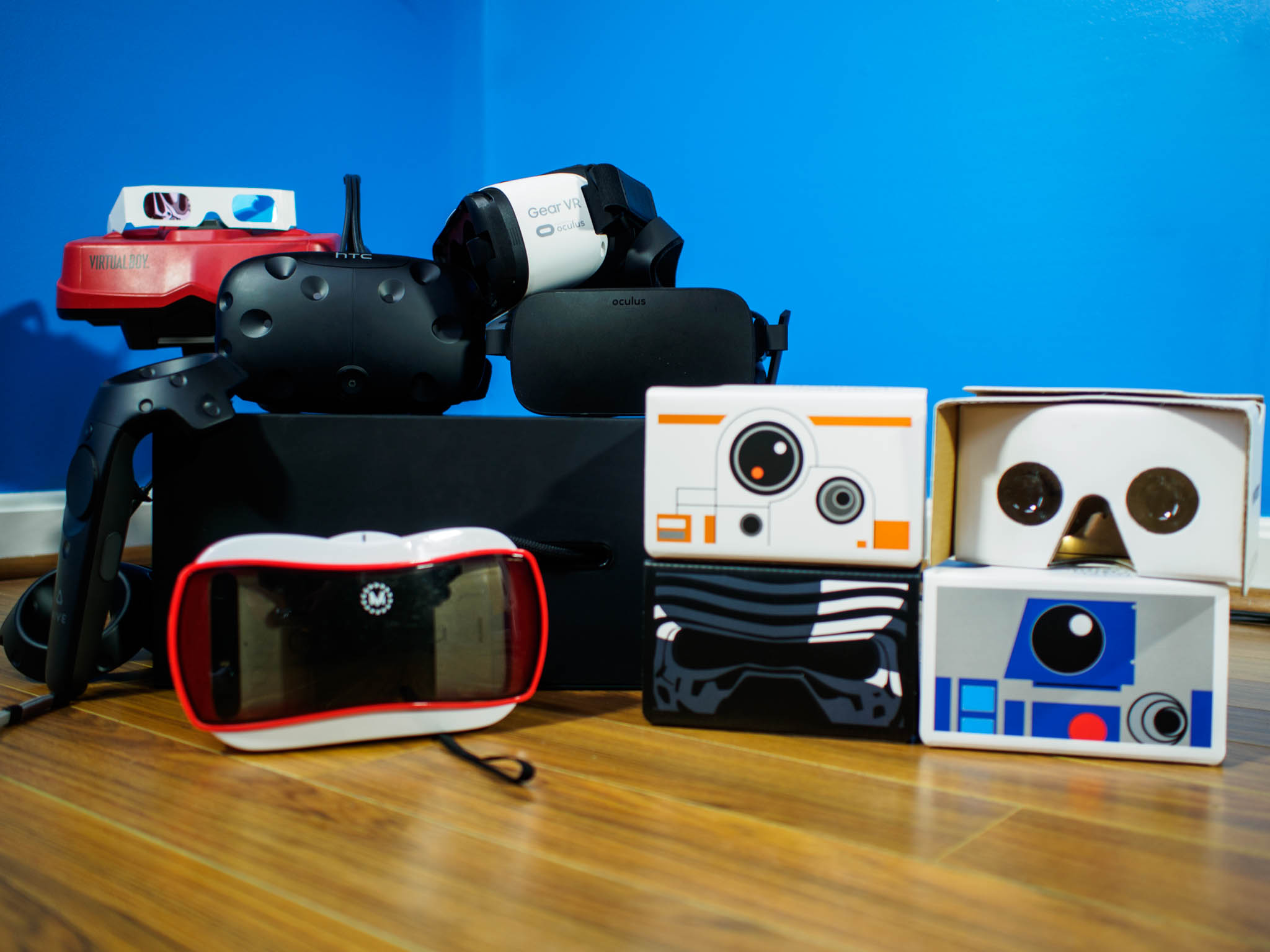Apple and making the virtual a reality

That was a friend of mine after his HTC Vive arrived this week and he tried it for the first time. I understood the sentiment: Another friend of mine, my colleague Georgia Dow, got her HTC Vive last week and I've already spent a couple days trying it out. (I ordered an Oculus Rift, sadly, which won't arrive until July.)
I've played several games on the Vive. I've watched a story. I've painted the Batman in 3D. I completely understand.
"This is different than netbooks," my friend said. "I've been letting my friends try it out, none of whom are gamers, and they've all immediately wanted to run out and buy it. It's the next big thing!"
His reaction, like mine, is an example of minimal delightful product. HTC Vive is a giant faceplate with a bunch of cables coming out the back that need to be plugged into a high-end gaming PC. And no one cares. It's such a great experience everyone who tries it wants to get it immediately and show all their friends, so their friends can go get it too.
I haven't gamed seriously since the N64 and original Xbox, and yet, in its afterglow, I wanted to buy it as well. Even with an Oculus on the way. The enthusiasm is contagious.
Fear of Apple missing out
FOAMA is a real thing. Apple had to release a netbook. Apple had to release a tablet. A television set. A watch. Now, a VR headset.
Apple is absolutely working on VR, and anything and everything else you could imagine Apple might be working on.
Apple did release a tablet and a watch. Apple never released a television set. Apple never released a high-end gaming Mac, a mid-range tower Mac, or a dedicated gaming console. Apple did release a new Apple TV that can run games, but gave it a previous-generation chipset to keep the price-point down. Apple has not, as yet, released a VR product.
Master your iPhone in minutes
iMore offers spot-on advice and guidance from our team of experts, with decades of Apple device experience to lean on. Learn more with iMore!
There's a team working on VR at Apple, of course. Even if it hadn't been reported by the Financial Times, it would be a no-brainer. Apple has incredible resources. If anyone online can postulate about what Apple may be working on, Apple can afford to spend a lot of money exploring and prototyping it. Apple is absolutely working on VR, and anything and everything else you could imagine Apple might be working on.
When the company says "a thousand 'nos' for every 'yes'", that mantra requires a thousand experiments and prototypes to say "no" to. Over and over again. "No". "Nope". "Not a chance." "Not yet." Only a very, very few become a "yes".
Would a Galaxy Gear-style product become a "yes" from Apple? Would an Oculus Rift- or HTC Vive-style product?
First to market

Apple has a symbiotic relationship with moon-shooters and first-movers. By letting them lead the way, Apple learns from the market's reaction and ultimately creates a product that mainstreams the technology. The moon-shot'ers and first-movers then learn from what Apple's done and iterate their own products. We all benefit from the relationship.
Apple never made a netbook, it made iPad and MacBook Air.
Though Apple never made a netbook, it made iPad and MacBook Air, and a few years later netbooks were gone and every tablet and ultrabook converged on Apple's.
In the labs, I wouldn't be surprised at all to see prototype Apple VR headsets and "vrOS", in a range of types and in various stages of exploration. In the imminent pipeline, I have a harder time seeing it:
- Samsung Gear VR, which straps a phone to your face, requires a phone with a resolution higher than even the 1080p display on the iPhone Plus series in order to provide a good experience. And at its best it's a phone strapped to your face. Apple didn't even make its own bands to strap the iPod nano to your wrist...
- Oculus Rift and HTC Vive need to be hardwired into high-end gaming PCs. Apple, infamously, doesn't even make a Mac that can easily drive such a headset. Never mind such a headset.
- Consumer VR content is primarily games and entertainment right now. Apple, to the chagrin of many, has never prioritized gaming. (Apple has one of the most successful gaming platforms in iOS and yet makes not a single first party game for it.) While iTunes is an entertainment powerhouse, it will be a long time before it offers a compelling amount of 4K content, much less VR content.
- Providing deep Mac or iPhone integration through a great interface is something an Apple VR system could offer, but that's never been enough. Apple only enters markets where it feels it can make a significant contribution. For iPhone is was making smartphones that didn't suck. For iPad it was the future of mainstream computing. For Apple Watch it was health and fitness. What could Apple, today, contribute to VR?
- First-movers seldom win product categories. Apple learned that lesson in the PC-era. Neither Palm nor Nokia nor BlackBerry won phones. Microsoft didn't win tablets. (Or mobile.) Pebble likely won't win wearables. VR could be different. HTC and Oculus could well win. But there's nothing yet, beyond first-blush exhilaration, to indicate how this category will shake out in the years to come.
Apple VR
To be clear, I love what HTC has done with Vive. I'm hoping to love what Oculus has done with Rift as well. But neither is likely the ultimate expression of VR as a consumer product. They're the very beginning. And Apple has never been a company that felt the urgent need to enter consumer product categories at the very beginning.
My colleague, Michael Gartenberg wrote:
When, and if Apple does bring a VR product to market it will look very different from anything we've seen before or see today. That kind of leap is what Apple looks for prior to making things that are virtual into reality.And it's what Apple will look for before bringing VR to any of the company's products.
I'm not sure VR headsets will ever be as ubiquitous as phones or televisions, though VR technology could well be as ubiquitous as flat panel displays are today.
It's possible Apple will own the endpoint of some expressions of that technology, the way it does with iPhone. It's also possible Apple will "only" own the platform layer of other expressions, the way it does with Apple TV.
And that's what it feels like Apple needs to do when it comes to VR: Figure out what, if any, product it can ship that makes a significant contribution, and when.

Rene Ritchie is one of the most respected Apple analysts in the business, reaching a combined audience of over 40 million readers a month. His YouTube channel, Vector, has over 90 thousand subscribers and 14 million views and his podcasts, including Debug, have been downloaded over 20 million times. He also regularly co-hosts MacBreak Weekly for the TWiT network and co-hosted CES Live! and Talk Mobile. Based in Montreal, Rene is a former director of product marketing, web developer, and graphic designer. He's authored several books and appeared on numerous television and radio segments to discuss Apple and the technology industry. When not working, he likes to cook, grapple, and spend time with his friends and family.
